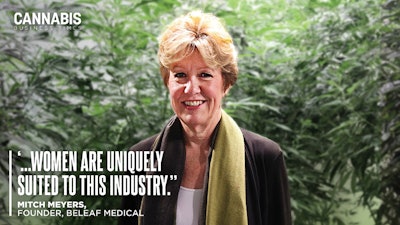
Missouri is one of the fastest-growing cannabis markets in the U.S., and Mitch Meyers has been there since the beginning.
As the founder of one of the first two companies to receive a license in 2015 to cultivate hemp to extract CBD, Meyers helped lay the groundwork for the state that has, in less than a decade, transformed from CBD-only production, to a medical market, to an industry that generated more than $1 billion in its first year of adult-use sales in 2023.
And Meyers’ company, BeLeaf Medical, has grown right along with it. The vertically integrated business expanded into adult-use last February, and operates cultivation and manufacturing, five SWADE dispensaries, and produces flower, prerolls, live sauce cartridges, concentrates and edibles under the brand SINSE.
Meyers had spent decades building and marketing brands, and cannabis had never been part of the plan. After a celebrated career in marketing for Anheuser-Busch and founding her own advertising agency representing household names such as Miller, Bacardi, and Energizer, Meyers sold her business in 2003 and retired. (She is credited for creating Bud Light’s Spuds MacKenzie mascot, “the original party animal” bull terrier sporting sunglasses and button-down shirts, a campaign that boosted Bud Light’s beer sales by 20% between 1987 and 1988, according to The New York Times.)
Years later, she started traveling to Colorado to visit her kids, Zach and Abbey, who were going to college in Boulder, and was fascinated by the emerging medical cannabis market there and in Denver. She’d visit dispensaries and talk to owners, who’d share their time and tell her about the market. To her surprise, she says they were much more open than she anticipated.
“And I recognized immediately what a community it was, how people were just trying to help people with this plant. And I'm telling you, I would knock on every door I could find, and they'd let me in and answer my questions, which coming from the alcohol beverage industry—which is so secretive, can't tell anybody anything—I was mesmerized by what a caring community it was,” Meyers recalls.
That was the beginnings of what has now been a decade-plus stint in the licensed cannabis industry, during which time Meyers has launched several businesses, including a dispensary in Chicago and the companies she's built in Missouri.
In this conversation, Cannabis Business Times talks with Meyers about the lessons she's applied from her previous work to cannabis, the challenges of a business launch, her experience being a woman and a leader in male-dominated industries, and why you can't make assumptions in the ever-evolving, regulated cannabis market.
Michelle Simakis: When you first received your license to operate BeLeaf as a cultivator for CBD extract in 2015, there were not many women in the industry, and there are still few women leading cannabis businesses today. Can you talk about what your experience was like being a woman in the early days of the cannabis industry?
Mitch Meyers: I always tell people that I had two brothers and my dad and my grandpa—and I was the wide receiver on my family football league (only woman, learned to run so fast to not be crushed by sweaty boys.) So I'm always playing with the guys, working with the guys. I [worked for] Anheuser-Busch—that's a locker room. And so I've never seen myself as different from them. I really didn't think about, “Well, can women make it in this business?” I just did it.
And I think as caregivers, women are uniquely suited to this industry. You just have to not assume that you can't do it. I have probably raised 90% of the capital in the businesses that I've been running, and that's my least favorite thing to do. And I can tell you, it's all been with men. And there was one family that was going to [invest in it] for a family foundation, and I presented everything to them, and everybody's sitting around the table, and the dad, who was obviously in charge of the purse strings, looks at me and just had a weird, snarky look on his face. He goes, “Who hired you for this job?” It just kind of took me by surprise. And I'm like, “Nobody hired me. I started the thing.” He looked at me [like he] he couldn't believe it. I'm there asking for $14 million.
That surprised me. … He just assumed there were a bunch of guys behind me.
Simakis: Acquiring capital is one of the largest challenges in cannabis. Can you talk about some of the challenges of launching the business? And the challenges that continue today?
Meyers: The biggest issue in cannabis is everything changes about every 18 months. Sometimes they move forward and sometimes they move backward. So that sort of insecurity in the legislative landscape is a challenge.
"I didn't think about, 'Well, can women make it in this business?' I just did it."
When we got started in Missouri, when we found out we got our licenses, it was December of 2019/January of 2020, and we had 12 months to get all of our licenses operational. It was the beginning of COVID.
And trying to get equipment, HVAC, equipment, lighting, all that kind of stuff was really challenging, and raising capital at the same time, when everybody's scared to death—they don’t know, should I give my money to something speculative like this? So that was a challenge.
And then things looked pretty rosy [in] 2019—in terms of cannabis businesses selling for great multiples, that lasted for about 18 months. And everybody thought, “This is great. We can build a company and sell it for 10 times EBIDA.” Well, that's over now. We missed that window, and now there's potentially blue skies with moving to Schedule III, maybe getting SAFE banking.
But again, you have to have the ability to manage the chaos to be successful in cannabis, because otherwise, if you're so rigid, you'll be disappointed and you'll be out of it. And I have seen people do that. I've seen people say, “I thought I was going to get rich quick.” And I tell people that when I go to do a speech somewhere: “If you want to invest in this because you think you're going to get rich overnight, buy a McDonald's franchise. This is not for you.”
[Sometimes] my daughter says, "Mom, just walk away." I'm like, you don't understand. I feel responsible for returning my investors' money. And that might be something that women feel more responsible for than men do. I don't know. I've had investors say to me, we invested in you. And I take that to heart.
Simakis: Where are you landing now in terms of your strategy? I know that there's a lot of uncertainty with what would actually happen to the state-legal cannabis programs if cannabis were moved to Schedule III. What do you think your business will look like in five years?
Meyers: If someone is going to acquire us, would they prefer to have us with smaller operations in three states, or would they like for us to be big in one state? And where we're landing is to be a really well-run, profitable company that is cash flow positive, paying your taxes—even at the 280E level—having a well-trained workforce.
And so that's what we're focusing on, is being one of the really good, strong players in Missouri. If I could choose to go to another state, Ohio or Maryland would be where I'd want to go, because it's controlled licensing.
Simakis: When you think about being a strong business in Missouri, how do you build a strong brand with BeLeaf, SWADE and SINSE and stand out at the consumer level as opposed to at the investor level?
Meyers: Because we're vertically integrated, we have products that we produce and sell throughout the state, and so we gave those products different names than the name of our dispensary. As we're going through the naming hierarchy, I started looking for names for retail that would be simple, fun. I love one word, if you can come up with them. And I wanted to try to trademark it so that we could make sure it's protected. And so we ended up just making it up. We made up the word SWADE because SWADE made us think about the plants moving and interacting with the human body. We have this little infinity sign that goes with it. We will make it have meaning. It's like Google didn't mean anything until they chose it for the name of their company. And then the product name is SINSE, which is short for sinsemilla, the female flower. And so now that brand is not only sold in our own stores, but it's sold in all our competitor stores as well. They don't feel like they're promoting my retail account because my product and my stores have [different] names. And that brand can then travel across state lines. So if I wanted to introduce it in another state, I could.
Simakis: What is the biggest lesson you learned in your career before cannabis that you've brought to this industry?
Meyers: I'm convinced that you can come up with any name, and if you do it correctly, you can make it live and have meaning to people, but you have to be consistent with that. So when [customers] come into our stores, they need to feel like they have seen the brand and they understand it, but the feeling that you get from the staff has to reinforce everything that we've built. And it's pretty simple, but you have to not be distracted. People respond to bright shiny objects.
It's really just the consistency and the brand voice that you speak with and maintaining that. And sometimes that gets a little boring. I've seen this with packaged goods companies forever, that every time you turn over your marketing department, they want to re-do everything, new logos, new packaging, new everything. And I always love the story of Philip Morris and Marlboro. They had one advertising agency [since 1954]. And the reason they did that is because that agency, Leo Burnett, maintained the brand voice and look and feel.
Simakis: How would you describe your brand voice? What do you hope resonates with people when they approach one of your brands, whether it be BeLeaf, SWADE or SINSE?
Meyers: For the dispensary, I want them to think that it's a community. When they come in the doors of any SWADE, we have a very consistent look. What we're really offering is customer service. And so if somebody is a consistent customer and they've ordered online and they're in a hurry, I want to make sure my receptionist knows their name. If somebody is new to the store or somebody walks in and they just want to shop, I want them to feel comfortable, and somebody to be there to answer their questions. You're not going to be harassed. But it really truly is a customer service model, and people can take what they want from it. And if that's nothing, they can get out of there quickly. But if they want to know what new products we have or specials we have, there's always going to be something going on in store.
We get people ... who are triggered by a lot of things. So when they can come in and feel comfortable and sit on a couch or talk to their favorite patient care specialists, that's what we want. The only thing is that it's very price competitive. A lot of [people] are just shopping for cheap flower. We want to provide more of a comforting environment and more customer service than that.
Simakis: I read that you were one of the founding members of We Are Jaine, a Missouri-based cannabis organization that supports women in the industry. What does the group do to elevate women, and why is this important?
Meyers: We are bringing women into the industry. We're helping them understand what it's about, training them, trying to do networking events so that if they want to meet people that are owner-operators, they can.
[BeLeaf’s] head of cultivation and manufacturing are women. All five of my [SWADE dispensary] general managers are women. And it's only because they were the best employees, not because they were women.
I don't feel like it's a male versus female, at least in our town, but I think [men] realize how important we are to the success of these businesses. We all feel like we [women] were on the ground floor [in Missouri], honestly, the men around us give us that credit. Women make the decisions for their family. I just went through being a caretaker for my mother and my dad. And so we're making decisions for more than just ourselves. And so we can have a big impact on the success of the business.
Editor's Note: This conversation has been edited for length, clarity and style.


























